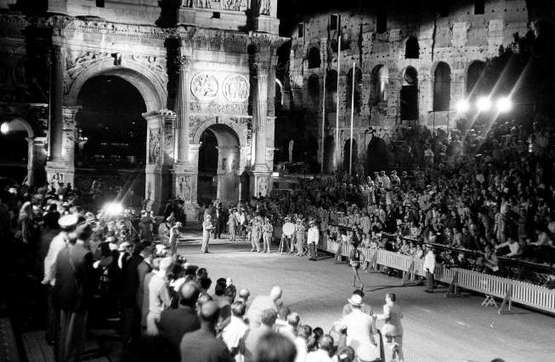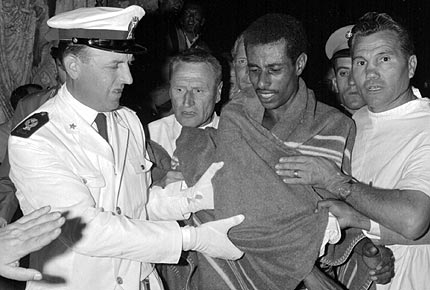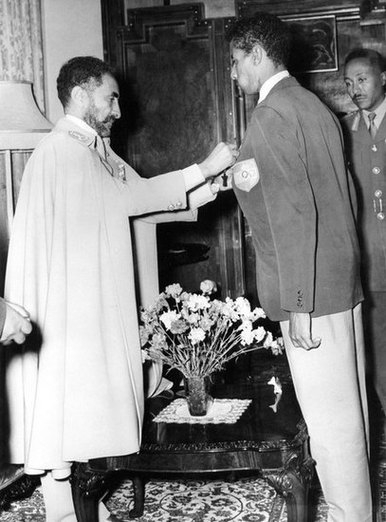
Above: After a tragic accident in 1969 left former
marathon runner and winner of two Olympic gold medals Abebe
Bikila paraplegic, he took up archery as a sport. He is pictured
here practising archery from his wheelchair in preparation for
the International Paraplegic Games being held at the Stoke
Mandeville Stadium in Aylesbury, Buckinghamshire on 20th July
1970. He suffered a severe spinal injury which ended his running
career. (Photo by Roger Jackson/Central Press/Getty Images)
BOOK
The glory trail (The Guardian)
It was the Rome Olympics of 1960 and an unknown produced the biggest surprise. Abebe Bikila, who’d begun running as a shepherd boy in the hills of Ethiopia, strode barefoot to victory in the marathon. He was the first black African to win Olympic gold. Tim Judah tells his story. Read More.
Abebe Bikila: an athlete par excellence (The Hindu)
V. V. Subrahmanyam
In 13 editions since its debut in Olympics, Ethiopia has scripted some of the most famous feats in track events — winning 14 gold, five silver and 12 bronze medals. But, not many of its athletes can match the aura and greatness of Abebe Bikila — the first black African athlete to win an Olympic gold medal (1960 Rome Games) and the first athlete to win the Olympic marathon gold twice.
It was a unique marathon in Rome — neither did it start nor finish in the main Olympic Stadium. And, the later part of the event was run in the dark, the route lit by the Roman soldiers holding torches. Inspirational sight enough for this Ethiopian to conquer Rome!

1960 SUMMER OLYMPICS TRACK FIELD MEN’S MARATHON: ETH BAREFOOTED RUNNER ABEBE
BIKILA IN ACTION APPROACHING THE ARCH OF CONSTANTINE, ON HIS WAY TO WINNING RACE
HELD AT NIGHT DUE TO SWELTERING SUMMER HEAT DURING THE DAY. BIKILA SET A NEW
WORLD REORD AT 2:15:16.2.(Sportsillustrated)
A legend
“I wanted the world to know that my country, Ethiopia, has always won with determination and heroism.” (Abebe Bikila responding to a question after he won the Olympic gold at the 1960 Rome Games on why he ran barefoot.)

Barefoot: Bikila won Olympic gold at the 1960 Rome Games (Britannica.com)
Born to a shepherd, Abebe Bikila was a legend in his own way.
When he could not find shoes which fit comfortably, Bikila decided to run the marathon barefoot, exactly the way he trained. A decision which stunned the fellow competitors but did not affect his grit and determination.
And, the rest is history. Bikila and his nearest challenger Rhadi had created a gap from the rest of the pack.
They stayed together until the last 500m when the Ethiopian changed gears to set a World record time of 2:15:16.2.

Rome: 10 September 1960, Rome, Italy. Abebe Bikila (Contrasto.it)
“I wanted the world to know that my country, Ethiopia, has always won with determination and heroism,” was his reply to a query on why he ran barefoot.

Legendary Abebe Bikila returns home with Africa’s first Olympic
Gold Medal. Bikila returned to Ethiopia as a hero. Emperor Haile
Selassie promoted him to the rank of corporal position in the
Imperial Bodyguard, where he served, and awarded him the
Star of Ethiopia. (tessemas.net)
Fate struck a tragic blow when Bikila met with a serious accident in 1969 which left him a paraplegic. He died in 1973 aged 41 due to cerebral haemorrhage. Read the story at Hindu.com
Watch this video about Abebe Bikila
Related: Olympic Moment in History: “And what’s this Ethiopian called?”


























I love Abebe Bikila! He is my true hero!! I was not even conceived when he won the Olympics, but my heart beats with love and pride whenever I hear his name. Just look at his face: a beautiful and strong human being with a kind spirit that lifted a nation up! He let the media light shine on Africa and Ethiopia in pleasant way. He united us as Ethiopians, as he united the world with Ethiopia.
It truly sadness me that such an extraordinary person and a gift to Ethiopia and the world is not respected in a way that he deserves to be honored. It is a national shame and disgrace for Ethiopia. And it is not the fault of one government or another, it is the fault of the Ethiopian people in general.
I am sorry to say, but if this amazing man had been born in America, Europe, Asia, instead of Ethiopia, you can rest assured that his people will make sure that there are a gazillion of books, movies, exhibitions made about him. We don’t even have a foundation in his name.
That’s a shame.
Gosh, he was so handsome too.
In my pre-teen years I used to go see Abebe Bikila’s MEQABIR at St Joseph Church every month or so. Me and my friends never talked about it but when one suggested the trip to St Joseph nobody objected. We knew Abebe Bikila’s sporting store at the Addis Stadium. And then I was glad there was a stadium built in Abebe Bikila’s memory by Addis.
Every Thuesday night I watched the sports news on TV. The sport program started with some clips including Abebe Bikila’s. Everybody knew Abebe Bikila and ofcourse was very proud of him. There was also a song for Abebe Bikila and Mamo Wolde. I never had the opporunity to see him live and can’t remeber seeing him or his funeral on TV either although I was born before he passed away.
I saw a whole film borrowed from Japanese Embassy at the basement of Medhaniyalem Church at Churchil Road and Abebe was long dead by then. I remeber there were about two hundred kids who usually make lots of noise in the dark when there is a film but that day Abba didn’t need to raise his voice. All was quiet from the start to end except for the cheering at the finish lines in Rome and Tokyo. Even after the film we were still quiet and Abba commented on that with deep emotional voice. My wife now was about six and her eyes were red and I tried to make fun of her when her father picked her up but I couldn’t say a word because my throat was hurting from trying to hold off my own tears. Half of the kids who watched the film were girls and almost all of them have cried and half the boys too. Abebe Bikila still has that thing which brings out emotion out of Ethiopians regardless of age and gender that no other can.